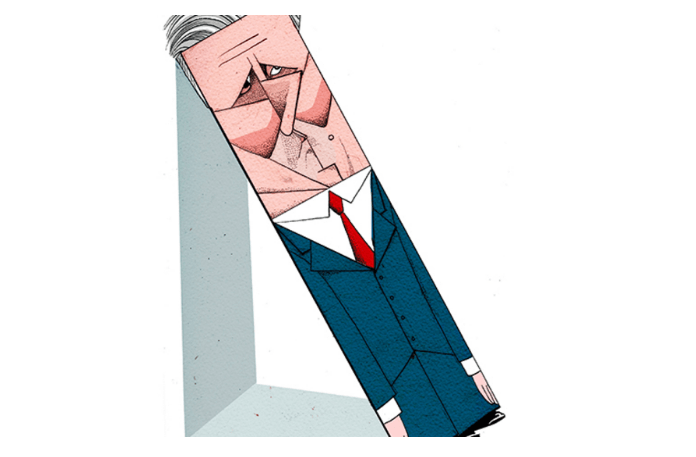The verdict of the Twitter jury is in, articulated in a single, now viral tweet by broadcaster Matthew Stadlen:
‘Keir Starmer would have been – and would be – a far better Prime Minister than Boris Johnson during this pandemic.’
It is a theme that Starmer has naturally been keen to develop, leading him to make excoriating criticisms of Boris Johnson in a press conference at the weekend. The Starmer thesis is that Johnson is so anxious to be liked that he ducks out of taking tough decisions until it is too late. The Labour leader cites examples that include the lateness of the original lockdown, an allegedly late-in-the-day decision to extend the furlough scheme, the lateness of the second lockdown and finally the last-minute cancellation of Christmas:
‘It was blatantly obvious last week that the PM’s plan for a free-for-all over Christmas was a risk too far… he did what he always does: dismissed the challenge, ruffled his hair and made a flippant comment’
The social media scene has lapped up this narrative. And to be fair, many natural Tories would agree that it is not entirely without merit. But as David Cameron once remarked: ‘Britain and Twitter are not the same thing.’ And it is also perfectly possible to think that Starmer has got Johnson’s limitations off to a tee and yet still prefer Johnson to Starmer as prime minister.
For starters, it is worth noting that while it may have been ‘blatantly obvious’ to Starmer last week that Christmas should have been called off, he didn’t quite say so at the time. Instead, in PMQs he hid behind an editorial in the British Medical Journal, only implying his own support for ending what he now describes as a ‘free-for-all’. The furthest Starmer was willing to commit himself was when he told Johnson that he should ‘listen’ to the BMJ advice (not ‘follow’ it, note).
This gave Johnson the opportunity for a scathing counter-blast:
‘I wish he had the guts to say what he really wants to do is to cancel the plans people have made and cancel Christmas. That is really, I think, what he is driving at…He could not make up his mind last week wether or not to support what the Government were doing to fight Covid and told his troops, heroically, to abstain. He could not make up his mind about Brexit…He cannot attack the Government if he cannot come up with a view of his own.’
The danger for Starmer is that this narrative sticks as well, casting him as what Tory backbencher Michael Fabricant referred to at the start of that PMQs session as a ‘smarmy lawyer’ – obsessed with clever tactics but unable to connect with the British public on an emotional level.
Watching Starmer refer at the weekend to millions of families being ‘heartbroken’ by the PM’s U-turn on Christmas restrictions underlined this point. It just didn’t ring true, landing as a wooden line scripted by someone else for a legal technocrat rather than as a heartfelt response from a family man.
The famous description by Aneurin Bevan of Hugh Gaitskell – another Labour leader who emerged from the ranks of the public sector technocracy – came to mind: ‘A desiccated calculating machine.’ Gaitskell went on to lose a general election that he had widely been expected to win.
Even in Starmer’s defence of the Union today, self-interest is to be found lurking very near the surface. While he may have asked Gordon Brown to come up with a ‘fresh and tangible offer’ to the Scottish people, he has also said that Nicola Sturgeon would have a mandate for another referendum on independence if the SNP should win a Holyrood majority next year (which it very probably will).
This breaches the terms of the 2014 referendum – that it would settle the matter for a generation – but maximises Starmer’s prospects of securing the support of SNP MPs to put him into Downing Street after the 2024 general election. Note again, that he claims to be personally against another referendum, while having taken a position that would allow one to go ahead. The smarmy lawyer strikes again.
Starmer’s personal polling has generally been quite good since he became Labour leader. YouGov’s most recent monthly tracker showed 45 per cent say he is doing well, compared to 29 per cent badly. But digging beneath the surface of that series reveals some worrying trends for him. Among working-class voters, the percentage saying he is doing well has merely nudged up from 32 to 36 since he debuted in May, but the percentage saying badly has shot up from 15 per cent to 28 per cent.
Looking at Leave voters this trend is just as marked. In May, 35 per cent said he was doing well. Now, as the percentage of respondents saying ‘don’t know’ has declined, that has turned into a fairly healthy looking 42 per cent. But the badly rating has rocketed from 24 per cent to 39 per cent. This surely underlines just how important to Starmer it is that the whole issue of Brexit should move into the rear-view mirror.
But it also tells us something else: the working class and Eurosceptic voters that Starmer will need to win back if Labour is to become the largest party at the next general election are increasingly open to a negative depiction of him as ‘Keir Smarmer’, the slippery lawyer-turned-politician who always leaves himself a get-out clause buried in the small print.
The stresses and intensity of a brutal year in British politics may well have highlighted some serious Boris Johnson shortcomings, but they have done the same to the Labour leader too.







Comments